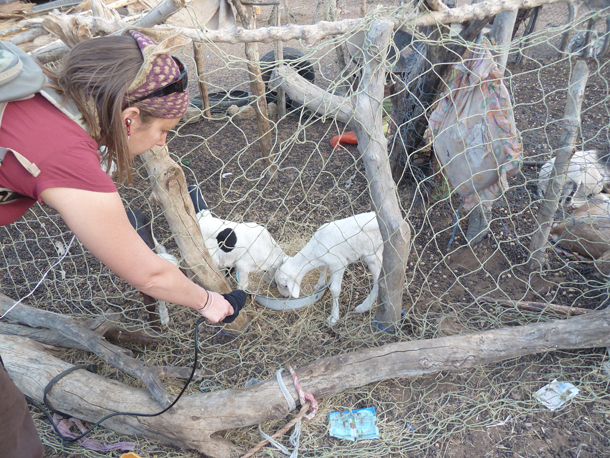Notes from Senegal: Tea Time
Published: February 6, 2018
By Bobby Bascomb

Living on Earth's Bobby Bascomb records the sounds of goats.
Attempts to record goat sounds led Living on Earth's Bobby Bascomb to be invited to tea and dinner with a Peuhl family outside their hut.
About an hour before dusk, I went for a walk through the Great Green Wall village of Widou, hoping to record sounds of goats. When you’re making a radio story this is a perfectly normal thing to do. But a local woman and her daughter looked perplexed as they watched me put a microphone in front of their goats. Nonetheless, they motioned for me to pass through the gate and into their sandy yard.
Neither my translator, Mark, nor I speak their language, Peuhl, and they don’t speak English or French but they still set down plastic chairs for us while a male relative began to make tea. Tea here is a ritual that can take several hours. Coals from the cooking fire are placed in a small metal bowl on a stand. A round blue teapot goes on top to steep. When the tea preparer thinks it’s ready, he adds at least a cup of sugar and a handful of mint. He pours it back and forth from the pot to cups until the sugar is mixed and the top of the tea is frothy. Then tiny tea cups are passed around on a small silver tray. It’s hot, sweet and bitter at the same time and everyone has 3 cups of tea before tea time is over.
A French-speaking guest named Albert joined us just as the tea was ready. He worked with a German reforestation project in the 1980s. For the current project the government wants to plant 12,000 acres of trees each year and all of them must be planted in the rainy season. But the rainy season is getting shorter and more unpredictable. Albert thinks the government’s goal is too ambitious; trees planted when it’s too dry will die.
After tea, out host invited to wash our hands and then presented us with a bowl of beef with onions and potatoes in a thick broth. I have not eaten beef in 19 years but there was no way I could refuse. For the Peuhl, eating beef is quite rare. They keep large herds of cattle but rarely eat them. Animals are mostly meant for market, sold for income. So along with Mark and Albert, I ate from the communal bowl with my right hand and complimented the chef.
Back to Africa's Great Green Wall of Trees
Living on Earth wants to hear from you!
Living on Earth
62 Calef Highway, Suite 212
Lee, NH 03861
Telephone: 617-287-4121
E-mail: comments@loe.org
Newsletter [Click here]
Donate to Living on Earth!
Living on Earth is an independent media program and relies entirely on contributions from listeners and institutions supporting public service. Please donate now to preserve an independent environmental voice.
NewsletterLiving on Earth offers a weekly delivery of the show's rundown to your mailbox. Sign up for our newsletter today!
 Sailors For The Sea: Be the change you want to sea.
Sailors For The Sea: Be the change you want to sea.
 The Grantham Foundation for the Protection of the Environment: Committed to protecting and improving the health of the global environment.
The Grantham Foundation for the Protection of the Environment: Committed to protecting and improving the health of the global environment.
 Contribute to Living on Earth and receive, as our gift to you, an archival print of one of Mark Seth Lender's extraordinary wildlife photographs. Follow the link to see Mark's current collection of photographs.
Contribute to Living on Earth and receive, as our gift to you, an archival print of one of Mark Seth Lender's extraordinary wildlife photographs. Follow the link to see Mark's current collection of photographs.
 Buy a signed copy of Mark Seth Lender's book Smeagull the Seagull & support Living on Earth
Buy a signed copy of Mark Seth Lender's book Smeagull the Seagull & support Living on Earth

